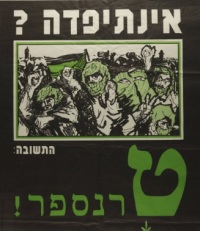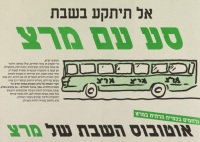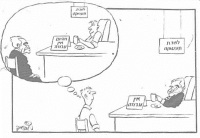The first intifada, which broke out in December 1987, mainly involved mass public protest rallies. In the early 1990s the situation began to change as Palestinians began to carry out localized attacks. Time after time Israelis were stabbed by single terrorists. In Jerusalem, Bat Yam, Jaffa, and other places, Israelis were murdered by terrorists armed with knives or the like. Though these attacks did have tactical or strategic effect, they did manage to undermine the sense of security of Israeli citizens. The latter even began to protest in outrage. The government, under Yitzhak Shamir, did not manage to handle the wave of attacks effectively and the atmosphere in the country grew darker by the day. Many began to think that the military solution to the intifada was unrealistic and that a diplomatic solution had to be found, i.e., negotiations with the Palestinians. Prime Minister Shamir, who was vehemently opposed to any territorial concession and no less to political concession that would recognize the Palestinians as a national entity, found himself at an impasse. |
|
 |
In 1990, after a failed Labor party bid to form a narrow coalition with the religious parties, Shamir's national unity government collapsed. Shamir subsequently headed a narrow coalition comprised of the Likud, right-wing parties and religious parties. Audit Israel controlled the labor and welfare portfolio and Shags held the absorption portfolio, at a time when Israel was experiencing mass immigration from the Soviet Union and Ethiopia. The ultra-Orthodox parties, which represent specific sectors, were perceived as prioritizing the interests of those sectors while the needs of Israelis in general, and the countless new immigrants in particular, grew more urgent.
The fact the government's existence was contingent on the support of the religious parties gave them the opportunity to promote religious legislation as they saw fit: laws dealing with public advertising, public transport on the Sabbath and so forth. At the same time, in the course of 1991, significant irregularities emerged in the transfer of state funds to religious institutions affiliated with parties that were part of the coalition. Riots in the streets of Jerusalem made the atmosphere even more unpleasant. The weakness of the government facilitated, on the other hand, the legislation of two basic laws: the freedom of occupation and human freedom and dignity. Both were fiercely opposed by the religious parties. The chasm between religious and secular appeared vast.
|
|
 |
As the 1992 elections approached, the State of Israel was feeling the economic burden that came with mass immigration from the Soviet Union. The absorption of the immigrants was a significant financial investment. Immigrants were in need of initial material assistance and later of help integrating in the workforce. As a result, unemployment topped 12% in 1991. The economy was in recession, both because of the security issues on both the Palestinian and Lebanese fronts. 1991 was a key year, characterized by huge immigration, security problems, a wave of strikes and a growing sense of bitterness among significant portions of the public in response to exposes of corruption in those affiliated with the establishment. The atmosphere was dark, both socially and economically. The sense that funds were not being correctly utilized and resources were being wasted, even when directed at absorption of immigrants or relief for the needy, exacerbated public disgruntlement. The public also latched onto the issue of "earmarked funds", monies that were allocated to religious bodies and organizations with coalition affiliations in an undeclared and non-transparent manner. Moreover, the political inertia foretold dark days for the Israeli economy.
|
|

|
